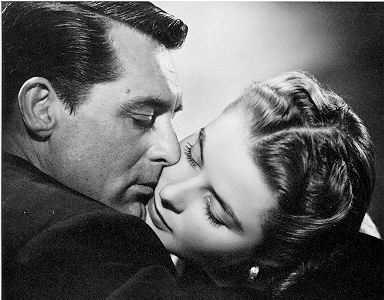Monday, February 14, 2011
Notorious. (1946) Alfred Hitchcock
So, it's Valentine's Day. Time to check out some black and white love.
Finding the love in this film, however, is less like waiting for a watched pot to boil and more like waiting for the same from a swimming pool. But a sizzler of a swimming pool it is.
Here are some of the awesome, awesome anti-love quotes that build to a stunning, intense, climactic attraction in Notorious:
Devlin: Why do you like that song?
Alicia: Because it's a lot of hooey. There's nothing like a love song to give you a good laugh.
Alicia: I like to make fun of myself. I'm pretending I'm a nice, unspoiled child, whose heart is full of daisies and buttercups.
Devlin: Nice daydream.
Alicia: The time has come when you must tell me that you have a wife and two adorable children, and this madness between us can't go on any longer.
Devlin: I bet you've heard that line often enough.
Alicia: That isn't fair, Dev.
Devlin: Skip it.
Devlin: Pretty fast work.
Alicia: That's what you wanted, wasn't it?
Devlin: Skip it.
Alicia: Well, you never believed in me anyway, so what's the difference?
Devlin: Lucky for both of us.
I'm certain the printed lines don't translate half as well as they do when performed by Cary Grant and Ingrid Bergman -- two well liked and well known actors playing "notorious" characters in a film by cinema's most admired and beloved director.
The romance in this film, or rather the built-up tension in the lack thereof, is, in the words of Jim Carrey in The Mask: "Sa-mokin." The chemistry between Grant and Bergman is of feverish intensity, but circumstances create a situation where only the wrong words can be said.
I always hated what I referred to as the "soap opera dilemma," which is that a bad situation could be 100% corrected if only just one line were spoken, but it never is. There's time for the line, but for some reason the info never gets relayed. In soap operas, the reason this happens is that people writing the show have to continue writing every day, and if they solve the problem today they'll get a bad case of writer's block tomorrow.
But here's a film that takes that space between the words and makes sense of it. There's always a reason the right words don't get said in Notorious, and the film is just as amazing for its perfect use of dialogue as it is for the dialogue left unsaid until the hopeful ending finally arrives.
It's plot is like a spy-thriller, a device Hitch fell in love with. Devlin is some type of Fed bringing Alicia, the loose, rich woman into an investigation against some post-war Nazis, where only she has what it takes to get inside. Her Benedict Arnold dad had connections with Germans setting up a company in Rio de Janeiro; she's to infiltrate the group by falling in love with one of its key players, but things nosedive when she falls instead for Devlin and the key player asks for her hand in marriage.
Last year I made a vow to myself to see more films by Hitch. I'll never aspire to cult status as a true film buff unless I make this so. I re-watched Vertigo and Rear Window, and for the first time took in North By Northwest, The Man Who Knew Too Much ('34), and Notorious. I'll freely admit that it took me a few viewings to really get into the world of Notorious, but I've fallen in love with this film over the past six months and can't get over what a masterpiece of cinema it is.
There's a shot in the middle of Notorious that begins at the top of a balcony with a long, winding staircase. You barely notice Ingrid Bergman on the floor below. The camera begins a long, steady zoom, as if gliding past the spiraling staircase, until you notice that it's got part of her back in the frame. You might wonder for a second why she's a little off center, not completely the center of focus. But the camera keeps zooming in, and now the picture is lopping off her head. She rests her hands behind her back, and we're not done zooming yet. Behind her back, her left hand is more and more revealed until finally, in perfect focus, the shot rests on a key in her hand, which is significant to the story in that moment. It is a breathtaking shot, to say the least. I didn't know they had cameras that could do this sort of thing sixty-five years ago, but it would still be an incredible shot by any of today's cinematographic standards.
It goes to show how the things from the past come more fully into focus over time, and how perfect they can be when we slowly let the picture zoom in on its aged, artistic majesty.
This is a wonderful film. It's an interesting love story, but it's best for the love in its spaces.
Subscribe to:
Post Comments (Atom)



This movie really is fantastic. The final shot, where the camera lingers on Rains, is just chilling.
ReplyDeleteIndeed. After "Psycho," is has risen to my second favorite Hitch, passing "Rear Window" and "Vertigo" along the way.
ReplyDelete